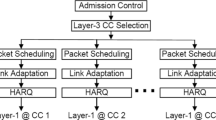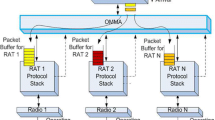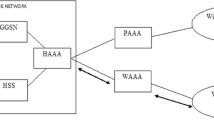Abstract
A recent trend in Internet usage has seen large amounts of multimedia data due to increasingly large numbers of mobile users. To facilitate higher bandwidth, modern mobile routers are capable of supporting simultaneous multi-band, leading to less interference, higher capacity and better reliability. However, there exists neither previous work that attempts to maximize utilization of available bandwidth in order to increase performance of multi-band mobile routers through the sharing of traffic classes among different frequency bands of the multi-band mobile router by scheduling, nor that shows multi-band routers are better than single band routers in realistic scenarios. In this paper, we have proposed a novel scheduling algorithm for multi-band mobile routers which transmits different classes of traffic through different frequency bands to achieve improved performance. We have developed an analytical model to perform queuing analysis of the proposed scheduling algorithm for multi-band mobile routers and derived various performance metrics, validated by extensive simulations. Our results show that the proposed scheduling model can improve performance by ensuring maximum possible utilization through sharing of capacities among the bands in multi-band systems. We show our results by comparing proposed multi-band scheduling model with single and current multi-band scheduling models. In addition, we compare single and multi-band mobile routers. It is evident from our results that multi-band systems are not always better than single band systems although multi-band systems are expected to have better performance. Based on the results, we have listed recommendations for selecting single or multi-band systems and allocation policies according to traffic conditions, and their priorities. Our proposed scheduling algorithms and related analysis will help network engineers build next generation mobile routers with higher throughput and utilization, ensuring less packet loss of different classes of traffic.

























Similar content being viewed by others
References
Singh, H., Hsu, J., Verma, L., Lee, S. S., & Ngo, C. (2011). Green operation of multi-band wireless LAN in 60 GHz and 2.4/5 GHz. In Consumer communications and networking conference (CCNC) (pp. 787–792). Las Vegas, NV.
Richter, F. (2013) Smartphone sales break the billion barrier. Accessed February 12, 2014 from http://www.statista.com/chart/777/global-connected-device-shipments/
Daniels, R., & Heath, R. (2007). 60 ghz wireless communications: Emerging requirements and design recommendations. IEEE Vehicular Technology Magazine, 2(3), 41–50.
Perahia, E., Cordeiro, C., Park, M., & Yang, L. L. (2010). IEEE 802.11ad: Defining the next generation multi-gbps Wi-Fi. In 7th IEEE consumer communications and networking conference (CCNC). Las Vegas, NV.
Heath, T., Diniz, B., Carrera, E. V., Meira Jr., W., & Bianchini, R. (2005). Energy conservation in heterogeneous server clusters. In Principles and practice of parallel programming (pp. 186–195). Chicago, IL.
Kumar, N., Chilamkurti, N., Park, J., & Park, D. (2011). load balancing with fair scheduling for multiclass priority traffic in wireless mesh networks. In J. Park, L. Yang, & C. Lee (Eds.), Future information technology, ser. Communications in computer and information science (Vol. 184, pp. 101–109). Berlin Heidelberg: Springer.
Lu, N., & Bigham, J. (2005). Utility-maximization bandwidth adaptation for multi-class traffic qos provisioning in wireless networks. In 1st ACM international workshop on quality of service&Amp; Security in wireless and mobile networks (pp. 136–143). Montreal, Canada.
Ghosh, A., Ha, S., Crabbe, E., & Rexford, J. (2013). Scalable multi-class traffic management in data center backbone networks. IEEE Journal on Selected Areas in Communications, 31(12), 2673–2684.
Akyildiz, I. F., Gutierrez-Estevez, D. M., & Reyes, E. C. (2010). The evolution to 4G cellular systems: LTE-advanced. Physical Communication, 3, 217–244.
Singh, S., Mudumbai, R., & Madhow, U. (2010). Distributed coordination with deaf neighbors: Efficient medium access for 60 GHz mesh networks. In IEEE INFOCOM. San Diego, CA.
Lin, Y., Lai, W., & Chen, R. (2000). Performance analysis for dual band PCS networks. IEEE Transactions on Computers, 49, 148–159.
Doppler, K., Wijting, C., Henttonen, T., & Valkealahti, K. (2008). Multiband scheduler for future communication systems. International Journal of Communications, Network and System Sciences, 1(1), 6744–6748.
Verma, L., & Lee, S. S. (2011). Multi-band Wi-Fi systems: A new direction in personal and community connectivity. In IEEE international conference on consumer electronics (ICCE) (pp. 665–666). Las Vegas, NV.
Samanta, R., Sanyal, G., & Bhattacharjee, P. (2009). Study and analysis of cellular wireless networks with multiclass traffic. In IEEE international advance computing conference (pp. 1081–1086). Patiala.
Alqahtani, M. N., Mahadi, W. N. L., & Tengkumohmed, T. F. (2010). Design of multi band antenna for wireless communication. In 2010 IEEE international conference on semiconductor electronics (pp. 338–343). Melaka.
Hossain, M. S., Narman, H., & Atiquzzaman, M. (2013). A novel scheduling and queue management scheme for multi-band mobile routers. In IEEE international conference on communications (ICC). Budapest, Hungary.
Narman, H., Hossain, M. S., & Atiquzzaman, M. (2013). Multi class traffic analysis of single and multi-band queuing system. In IEEE Global communications conference (GLOBECOM). Atlanta, GA.
Hossain, M. S., Atiquzzaman, M., & Ivancic, W. (2010). Scheduling and queue management for multi-class traffic in access router of mobility protocol. In IEEE HPCC (pp. 653–658). Melbourne, Australia.
Nasser, N., Karim, L., & Taleb, T. (2013). Dynamic multilevel priority packet scheduling scheme for wireless sensor network. IEEE Transactions on Wireless Communications, 12(4), 1236–1276.
Al-Sanabani, M., Shamala, S., Othman, M., & Zukarnain, Z. (2008). Multi-class bandwidth reservation scheme based on mobility prediction for handoff in multimedia wireless/mobile cellular networks. Wireless Personal Communications, 46(2), 143–163.
Gross, D., Shortle, J., Thompson, J., & Harris, C. M. (2008). Fundamentals of queueing theory. New York: Wiley-Interscience.
Avrachenkov, K. E., Vilchevsky, N. O., & Shevlyakov, G. L. (2005). Priority queueing with finite buffer size and randomized push-out mechanism. Performance Evaluation, 61, 1–16.
Zaborovsky, V., Zayats, O., & Mulukha, V. (2010). Priority queueing with finite buffer size and randomized push-out mechanism. In International conference on networking (pp. 316–320). Menuires.
Appenzeller, G., Keslassy, I., & McKeown, N. (2004). Sizing router buffers. Computer Communication Review, 34, 281–292.
Ahn, G., Campbell, A. T., Veres, A., & Sun, L. (2002). Supporting service differentiation for real-time and best-effort traffic in stateless wireless ad hoc networks (SWAN). IEEE Transactions on Mobile Computing, 1, 192–207.
Author information
Authors and Affiliations
Corresponding author
Rights and permissions
About this article
Cite this article
Narman, H.S., Hossain, M.S. & Atiquzzaman, M. Management and Analysis of Multi Class Traffic in Single and Multi-band Systems. Wireless Pers Commun 83, 231–258 (2015). https://doi.org/10.1007/s11277-015-2391-5
Published:
Issue Date:
DOI: https://doi.org/10.1007/s11277-015-2391-5




